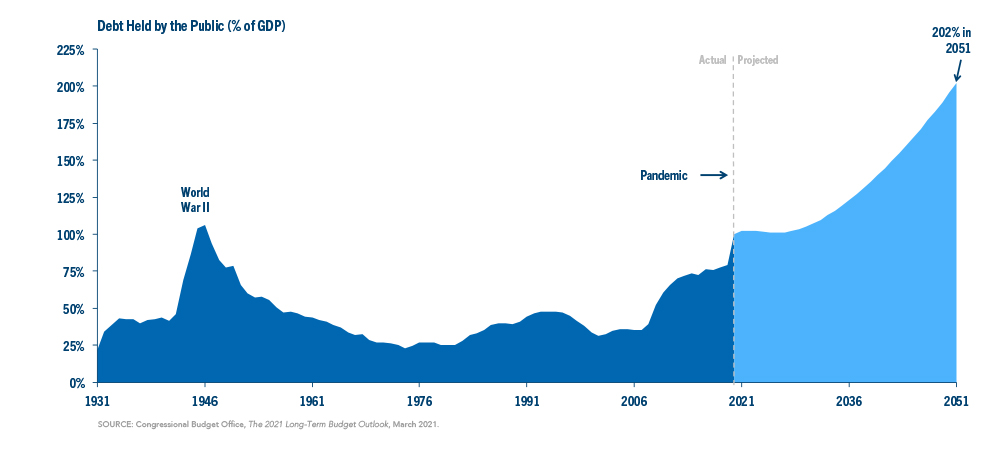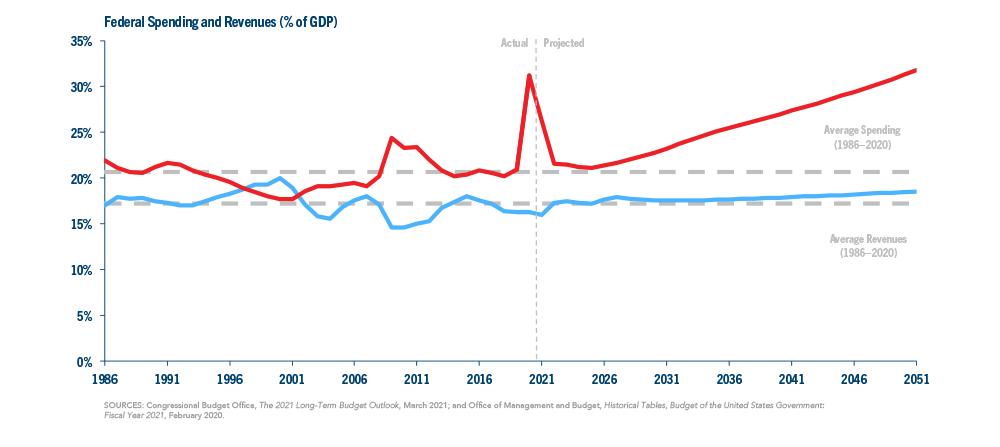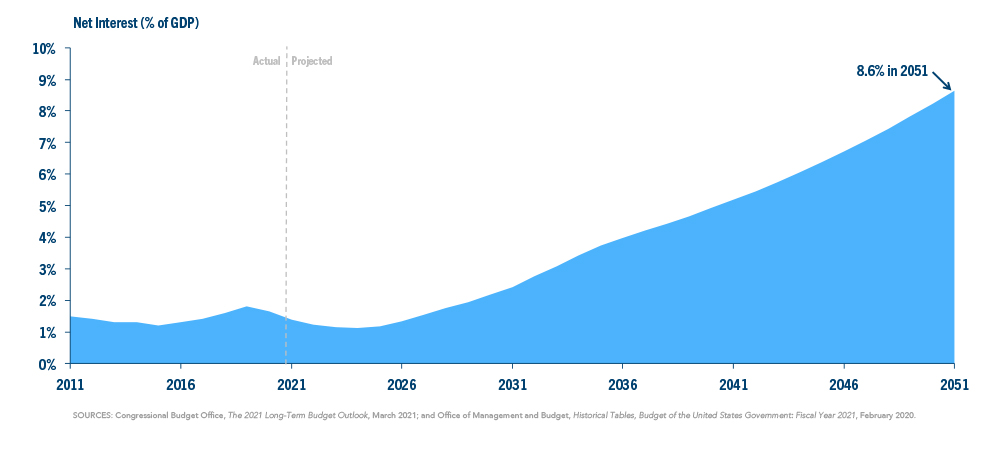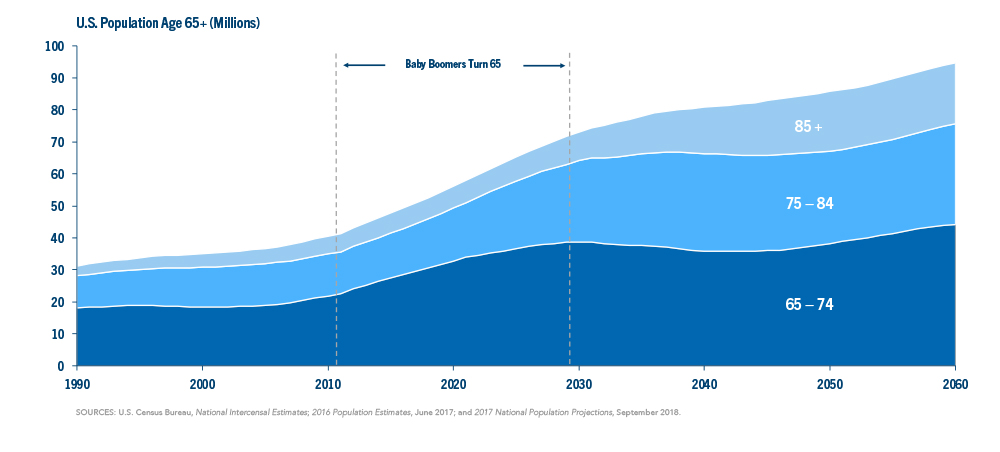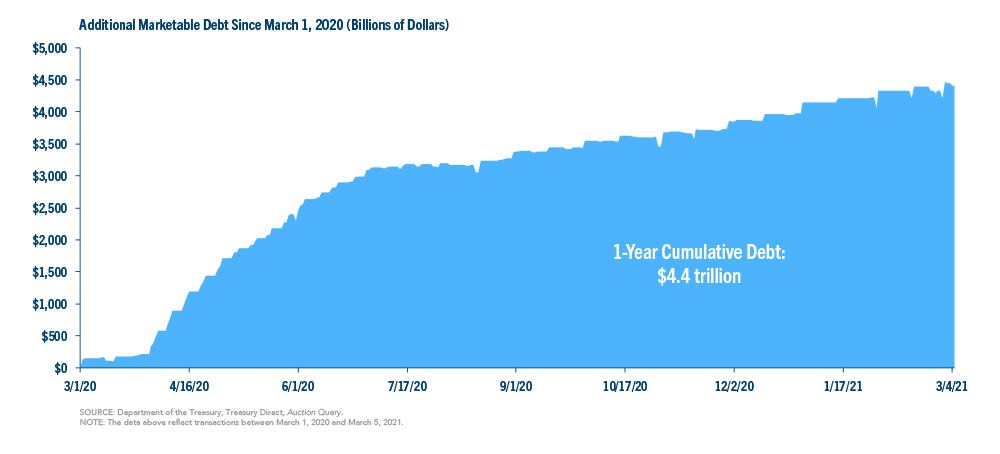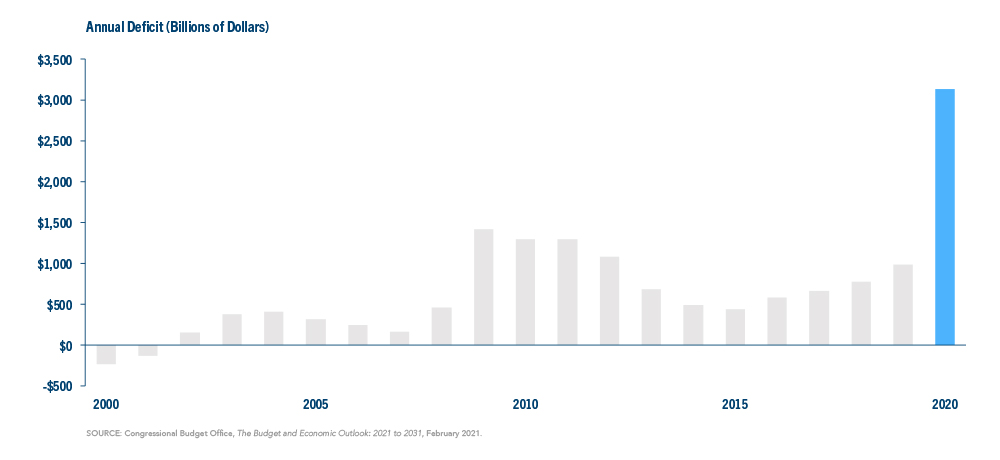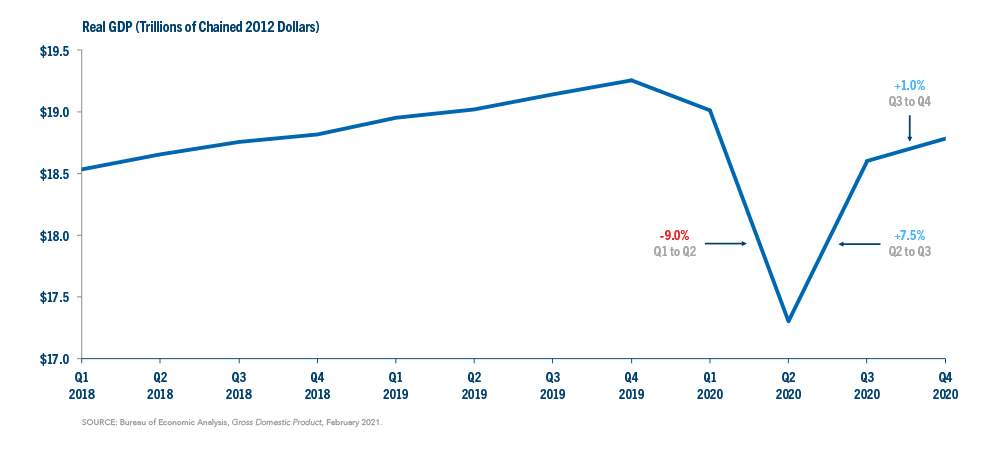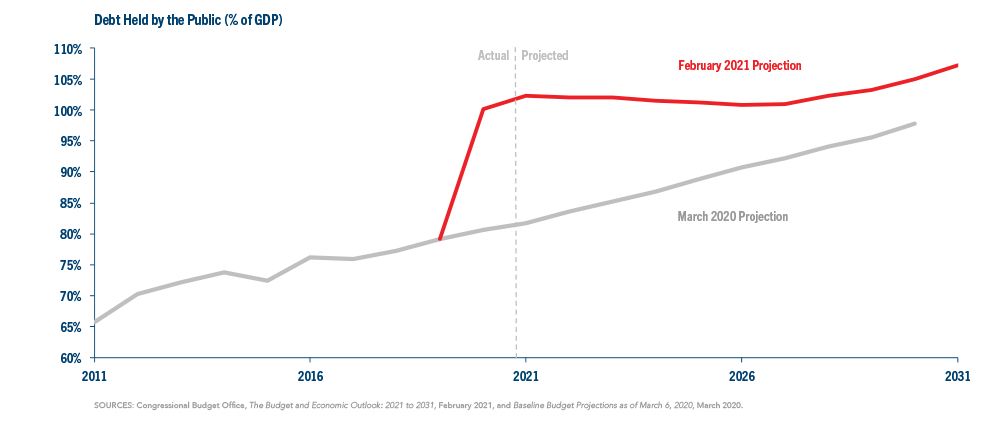What Does the National Debt Mean For America's Future?
America faces many critical questions about its future. As we continue to confront a global pandemic with devastating impacts on our health, economy and society, an effective federal response is necessary to help address critical needs and get our economy back on track. However, once the crisis is over, we must begin to address America’s unsustainable fiscal outlook, which will help ensure a stronger, better prepared and more resilient economy in the years to come.
Key Issues for America
Building a brighter fiscal and economic future is our responsibility to the next generation. The high cost of the coronavirus (COVID-19) pandemic, and the growing debt burden that comes with it, only reinforces the urgency of managing our debt once the crisis is behind us.
How the Pandemic Has Affected Our Fiscal and Economic Landscape
America entered this crisis with $23 trillion in national debt and trillion-dollar annual deficits growing as far as the eye can see. Having large and growing deficits during a strong economy is the definition of fiscal irresponsibility. Borrowing excessively in good times represents a moral injustice, which diminishes future prospects for the next generation.
The COVID crisis has only made an already unsustainable situation much worse. Now, our national debt has surpassed $27 trillion. Prior to the pandemic, our public debt was on a path to exceed the size of our entire economy in 10 years, but now we have already reached this unfortunate milestone. At the same time, our nation has suffered considerable economic damage, with millions out of work and steep declines in growth and opportunity.
We should go full steam ahead to beat this virus once and for all. It is critical to resolve the health crisis and restore our economy. But when this crisis is over, we must come to terms with our lack of national preparedness and inability to effectively manage our federal finances.
Fiscal Responsibility Is an Essential Part of Building a Positive Future
Identifying our nation’s priorities — and how we will pay for them — puts the country in a position of strength. Adequately funding effective, responsible investments in our future will help us grow in a smart and sustainable way. America must remain a leading, financially strong country that fulfills its moral obligation to future generations — and is better prepared for the unexpected.
An Unsustainable Path — Even Before the Pandemic
America has been on an unsustainable fiscal path for many years, since long before this pandemic. Our federal budget has structural problems, driven by well-known and predictable factors that include an aging population, rising healthcare costs and compounding interest—along with insufficient revenues to meet our commitments.
The Growing Debt Is Caused by a Structural Mismatch Between Spending and Revenues
Federal Debt Is on an Unsustainable Path
Net Interest Costs Are Projected to Rise Sharply
The Elderly Population Is Growing Rapidly and Living Longer
The Challenges Ahead
The COVID crisis has piled on to our already daunting fiscal challenges. Legislation enacted in response to the pandemic has been critical to combatting this crisis, but has added trillions of dollars to the debt. In addition, the significant slowdown of the economy has reduced federal revenues, which has further increased deficits.
Debt Has Increased Rapidly Since the End of March 2020
The Federal Deficit Drastically Increased in 2020
The Pandemic Has Led to a Reduction in the Size of the Economy
CBO’s Latest Projections Show That the COVID Pandemic Has Made Our Fiscal Trajectory Worse
Why Debt Matters
The COVID crisis has exposed critical vulnerabilities and inequities within our economy. Addressing our fiscal challenges and putting our debt on a sustainable path would allow our government to better plan, prepare and create a more secure and inclusive economic future.
So, Why Does the National Debt Matter?
High and rising federal debt matters because it reduces our flexibility to plan for and respond to urgent crises.
Debt matters because growing interest costs make it harder for us to invest in our future — to build and sustain infrastructure, enhance education and support an economy that creates job growth and rising wages.
Debt matters because it threatens the safety net — critical programs like Social Security, Medicaid, Medicare, SNAP and Unemployment Compensation are essential lifelines for our most vulnerable populations.
Debt matters because America faces emerging and ongoing challenges that will require resources to keep our country safe and strong — challenges like climate change, affordable health care, international conflicts and an increasingly complex and competitive global economy.
Debt matters because we care about our children and grandchildren. Borrowing more and more today reduces the opportunities and prosperity of the next generation.
The Future
Fiscal Responsibility Is About: Preparedness
None of us can say what the next major test of our nation will be — whether it’s an economic downturn, a national security threat, a climate disaster, another pandemic, or some other crisis. But as a wealthy nation, and with people’s lives and livelihoods in the balance, we must do more to prepare for the unexpected.
Preparedness includes determining national priorities — and finding ways to pay for them. It means making smart investments that benefit our economy over time. It means investing in our national security so that we can address new global threats, like cyber attacks. It means having stockpiles of essential supplies, so we are prepared for the unexpected. It means strengthening our safety net to help support and sustain the most vulnerable in society.
The truth is that we can’t adequately prepare for the future without a solid fiscal foundation. A sustainable budget will ensure that we have sufficient resources, in good times and bad, to meet the needs of our citizens and cope with whatever future challenges we may face.
Fiscal Responsibility Is About: Economic Opportunity and Jobs
America’s fiscal health and economic strength are inextricably linked. We can’t have a strong economy over the long run without a stable fiscal foundation.
Debt already exceeds the size of the entire economy and is on track to grow far out into the future, reducing our ability to invest in areas that provide the jobs and growth that define the middle class.
Right now, we’re spending nearly $1 billion every day on interest on the debt. Over the next ten years, the interest tab will grow to total nearly $4 trillion—and it will more than double every ten years thereafter.
So in many ways, instead of investing in our future, we’re paying for the past. Rising interest crowds out priorities like education, infrastructure and scientific research—key engines of growth and prosperity for our nation.
A sustainable fiscal outlook is an investment in our future economy, supporting vibrant growth over the long term, with rising wages and greater opportunity, productivity and mobility. Putting our nation on a sustainable fiscal path creates a more positive economic environment, with increased access to capital, more resources for future public and private investments, improved consumer and business confidence, and a stronger safety net.
Fiscal Responsibility Is About: The Next Generation
The next generation will know debt like no other. Personally, they are burdened by record student debt. But they are also entering the workforce during a time of unprecedented economic uncertainty, in a nation with crumbling infrastructure, a climate in crisis, rising inequality and racial injustice.
At the same time, they will inherit an unwelcome and costly legacy in the form of America’s $27 trillion — and rising — national debt.
We are morally obligated to ensure the next generation is able to define their own path, to control their own destiny and choose their own policies, without the burden of forever paying for our own current needs. A just and moral America is founded on the principle that we leave the next generation better off — with the financial freedom to decide how to direct their own future resources in the most effective, equitable and prosperous way.
Our fiscal capability is the foundation that creates opportunity for the next generation.
Moving Forward
The United States faces a range of complex, unprecedented health, economic and societal challenges, set against the backdrop of a poor fiscal outlook that was irresponsible and unsustainable to begin with.
Building a brighter future for the next generation is an essential priority for America, and the high cost of this crisis only makes that challenge more urgent. Once we have emerged from the pandemic, it will be more important than ever for our leaders to address our fiscal outlook and manage our debt, to ensure that America is more prepared, better positioned for growth, and able to meet our moral obligation to future generations.
